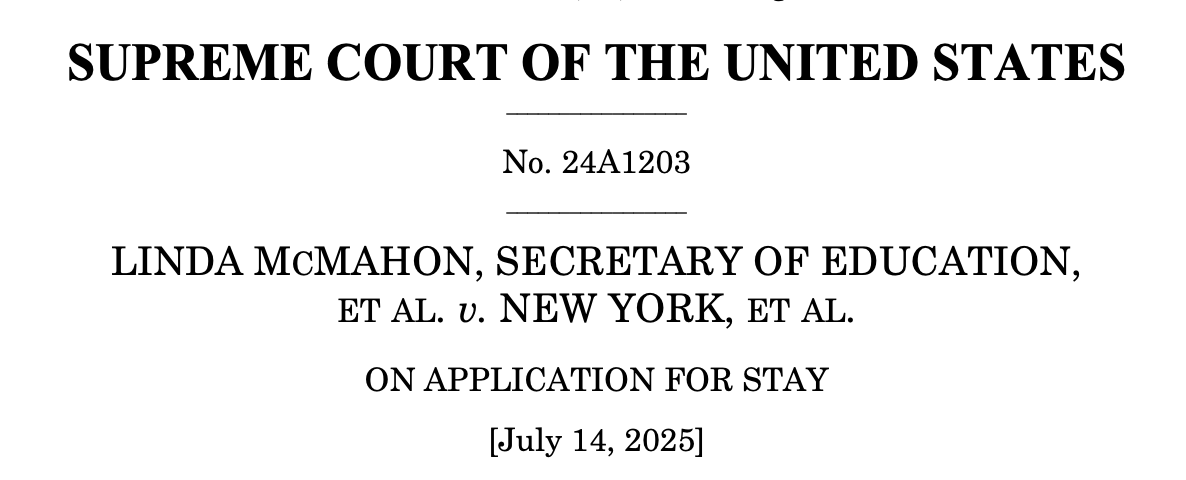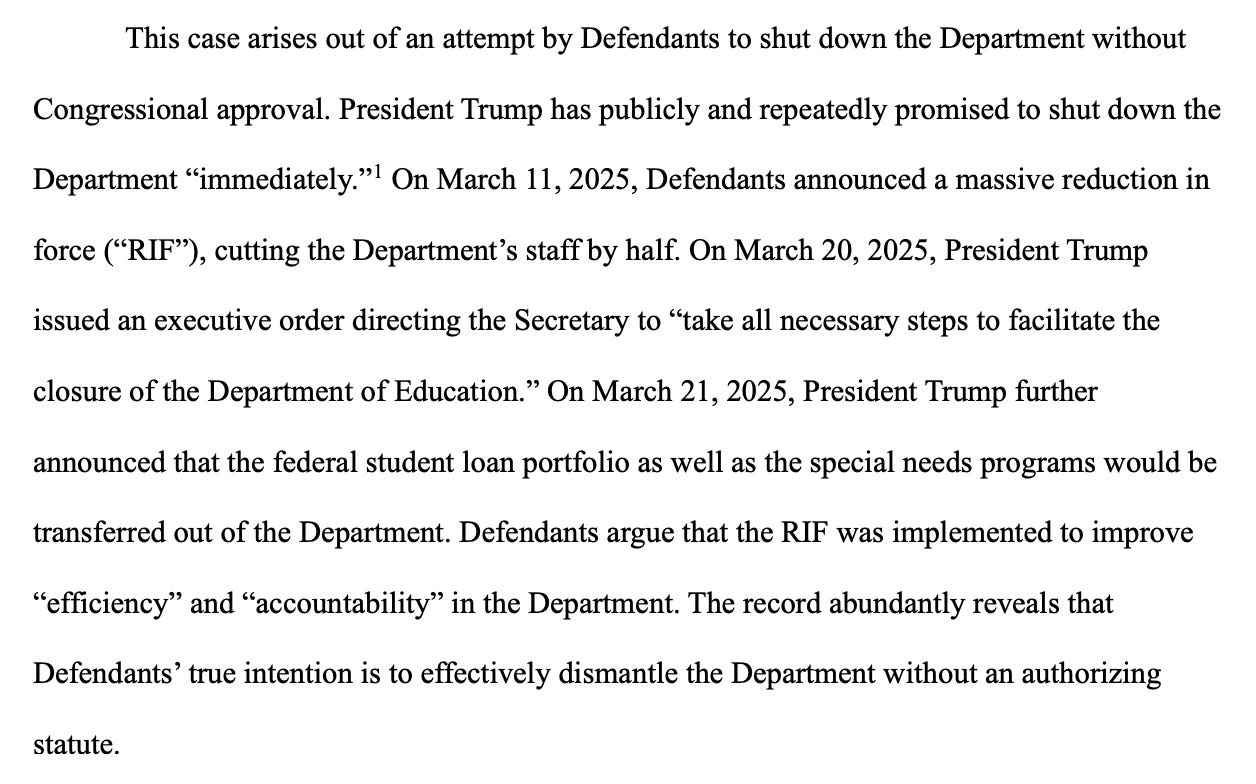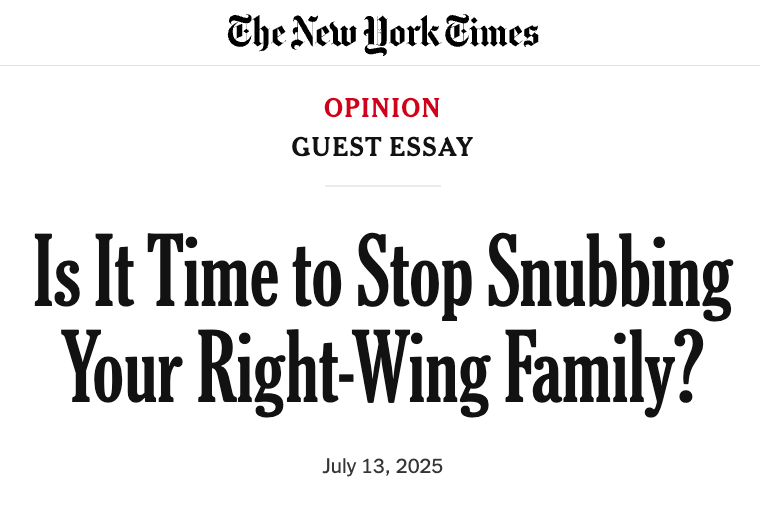The Roberts court allows Trump's gutting of the Education Dep't in a lawless ruling
Sotomayor, in dissent, wrote that "it is the Judiciary’s duty to check ... lawlessness, not expedite it." Also: In two Sunday essays, a contrasting reality of this moment.
On Monday afternoon, the U.S. Supreme Court’s Republican appointees allowed the Republican Trump administration to gut the Education Department, a lawless ruling that laid bare the empty politics of the Roberts court.
The was no reasoning provided by the majority, and yet, with their action, as Justice Sonia Sotomayor wrote in dissent for the Democratic appointees, the majority “hands the Executive the power to repeal statutes by firing all those necessary to carry them out.”
When it’s a Republican president, at least.
On May 22, U.S. District Judge Myong Joun, a Biden appointee, ruled that the Trump administration’s effort to “shut down” the Education Department was likely unconstitutional and illegal. The facts, as summed up by Joun in his 88-page opinion, are pretty simple:
As Joun explained of the mass reduction-in-force (RIF) efforts:
Specifically, in addition to violating the Administrative Procedure Act, Joun addressed how the actions are likely unconstitutional:
The Executive Order’s direction to “facilitate the closure of the Department of Education and return authority over education to the States and location communities” goes directly against Congress’s intent in creating the Department to “supplement and complement the efforts of States, the local school systems and other instrumentalities of the States, the private sector, public and private educational institutions, public and private nonprofit educational research institutions, community-based organizations, parents, and students to improve the quality of education.” … While it may be true that the President has the power to remove executive officers, … Defendants cite to no case that this power includes the power to dismantle Congressionally created departments and programs through mass terminations.
As such, he concluded, “These actions violate the separation of powers by violating the executive’s duties to take care to faithfully execute laws enacted by Congress, as well as its duties to expend funds that Congress has authorized it to appropriate.“ Accordingly, Joun issued the preliminary injunction.
The U.S. Court of Appeals for the First Circuit denied the Trump administration’s request for a stay pending appeal, itself providing a 26-page, detailed explanation for its order. Chief Judge David Barron, an Obama appointee, concluded the ruling for the unanimous three-judge panel as such:
On Monday, the Supreme Court implicitly rejected both of those courts’ decisions, issuing a stay that will allow Trump and Education Secretary Linda McMahon to destroy the federal agency.
This provided an answer to the question left with last week’s order allowing mass-RIF planning to continue across the government. Because last week’s order was — arguably — about executive power to set priorities, and not a ruling on whether specific implementation would be allowed, it remained possible that specific RIF implementation efforts might be blocked.
Not so, the Republican appointees on the court said Monday, blocking the two lower court rulings in this case as to an agency-specific RIF in a case “replete” with evidence of the Trump administration’s lawless intent “to effectively dismantle” the Education Department without congressional authorization.
Monday’s ruling would be offensive to the rule of law in any scenario, but for Chief Justice John Roberts, in particular, to do so in a case involving the Education Department, in particular, it is little more than the Chief Justice of the United States laughing in the face of Americans and the rule of law.
It was Roberts, two short years ago, who held that then-president Joe Biden’s administration overstepped when his education secretary interpreted the “waive or modify“ language in the HEROES Act to include forgiving student loans.
That, Roberts wrote for the court’s 6-3 majority, was not allowed. Here was Roberts on June 30, 2023:
Two years and two weeks after that ruling over the word “waive,” the Roberts court gave the Trump administration the go-ahead — on the shadow docket and with no reasoning — to “effectively dismantle” the Education Department, all of the laws to the contrary be damned.
As Sotomayor put it in dissent: “When the Executive publicly announces its intent to break the law, and then executes on that promise, it is the Judiciary’s duty to check that lawlessness, not expedite it.“
For today’s Supreme Court, that is a condemnation — not a statement of principle.
A court that does not follow such a simple truism is a court that is acknowledging its lawlessness.
A contrast in essays
Two essays published on Sunday highlighted to me the vast difference in how people left of center are experiencing this moment.
In The New York Times, David Litt, a former Obama speechwriter, wrote about surfing with his Joe Rogan-listening, vaccine-opponent brother-in-law.
Litt wrote about “a sorting into belief camps“ — highlighting, in 2025, his brother-in-law’s refusal to get the Covid-19 vaccine in 2021 — in discussing intentional cutting of family ties.
“No one is required to spend time with people they don’t care for,” Litt continued. “But those of us who feel an obligation to shun strategically need to ask: What has all this banishing accomplished? It’s not just ineffective. It’s counterproductive.”
After discussing how he and his brother-in-line reached a closer connection while surfing, he gave this bottom-line argument:
Our differences are meaningful, but allowing them to mean everything is part of how we ended up here. When we cut off contacts, or let algorithms sort us into warring factions, we forget that not so long ago, we used to have things to talk about that didn’t involve politics. Shunning plays into the hands of demagogues, making it easier for them to divide us and even, in some cases, to incite violence.
Then there was Hanif Abdurraqib, who wrote in The New Yorker about the night Zohran Mamdani and Mahmoud Khalil joined Ramy Youssef on stage at New York City’s Beacon Theatre.
The subhed made clear where this essay would be taking us: “What it feels like to laugh when the world expects you to disappear.”
The reality that Litt’s essay ignored was front and center — in fact, was a point — of what Abdurraqib would be telling us
Abdurraqib wrote about the people who are being shunned — and worse — by the government. This is not a question about who is invited to a holiday gathering; it is a question of whether the gathering is even possible.
Abdurraqib’s prose is art, but the story he tells is of a simple moment — a moment that powerful people wanted never to happen — at “a sold-out [comedy] show at the Beacon Theatre, in New York.”
As Ramy Youssef took the stage on June 28, Abdurraqib wrote: “Mahmoud Khalil, the Columbia graduate and pro-Palestinian activist just released from ICE detention, was in the front row. To his right sat his wife, Noor Abdalla. To his left, Zohran Mamdani,” who days earlier became the Democratic Party’s nominee to be the next mayor of New York City.
Abdurraqib continued:
It was a delight to catch a glimpse of Khalil in the throes of laughter. He laughed as though each laugh were a physical vessel urgently exiting his body, or a secret he’d held for so long that it had forced its way out. Khalil’s body jerked forward when he laughed—his laughter was more of a kinetic event than a sonic one. He rocked, he shook slightly, and he smiled wide. One seat over, Mamdani laughed, too, with a bit more volume; his laughter seemed to arrive less like a long-held secret than like an idea that he couldn’t wait to share. Most of the audience didn’t know that the two men were in the room, and because of this most of the audience missed out on the small miracle of watching them share their joy at the scene before them.
Khalil and Mamdani, Abdurraqib wrote, hadn’t met before that night. As they settled into discussion, death threats — a familiar topic to all three of them — came up.
“After this, there was a brief silence among the three of us, a beat of shared recognition of the difficulties of staying alive,“ Abdurraqib wrote, continuing:
In the lull, I found myself considering distance again—the distance that exists between two Muslim men who are navigating two distinct victories that thrust upon them similar concerns. I thought about the distance between the people who want you dead and the people who want you gone, vanished through deportation or a more mundane form of silencing. There might not be as much distance between those two groups as we’d like there to be, especially if their members are loud, have power, and are unafraid to publicly fantasize about material violence.
The “sorting into belief camps” of which Litt wrote plays out far differently when actual detention camps are the place into which the government wishes to — and does — sort you.
For more than 100 days, Khalil had no choice as to his whereabouts, let alone as to whether he should go surfing with Stephen Miller. (Litt actually wrote about this, concluding that he would “decline” to go surfing with Miller.)
Some people are not choosing who to “banish” from family events. The Trump administration wants to banish them from America.











Thank you as always, but especially today, for your moral clarity.
"Some people are not choosing who to “banish” from family events. The Trump administration wants to banish them from America. "
Well said, and a wonderful summary of the Hanif Abdurra writeup in the NYer. Even the repellent Dem "centrists" are (reluctantly) getting the Mamdani wave, and perhaps Bill Ackman & co. won't get the last laugh come November.
And the Supremes — dear god, after torching the Biden Administration's repeated requests for emergency relief regarding the student loan business, here they are, yet again, rolling over for tRump and his assault upon separation of powers, and involving the Dept. of Education. Who amongst us expected ANYTHING different?
“My goal today is to convince you that this court is not comprised of a bunch of partisan hacks,”
Amy Coney Barrett, 12 Sept. 2021
Noted.